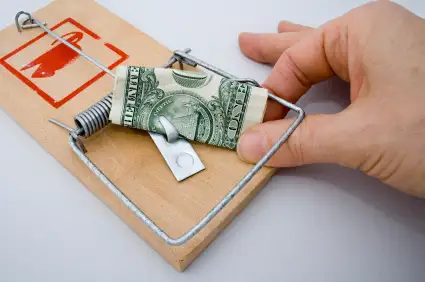
The U.S. Federal Trade Commission (FTC) and Visa have established a joint effort to warn consumers about timeshare resale fraud. Timeshare resale scams have generated a lot of consumer complaints: The FTC says they’ve “more than doubled in recent years” and the Florida Attorney General’s Office reports that timeshare fraud is its highest complaint category. The scammers won’t voluntarily quit: You have to defend your own interests.
The main scam, says the joint Visa-FTC release, is a phone offer to resell an unwanted timeshare:
A timeshare property owner gets a phone call with an offer to sell a vacation property to a waiting buyer. The timeshare owner is asked to sign a contract and pay a transaction fee—usually with a credit or debit card—before the alleged sale can proceed. But after the contract is signed and the fee collected, the timeshare owner rarely is contacted again by the reseller. In most cases, the buyer never existed, and the contract was for advertising services only. When the timeshare owner realizes this and calls to get the fee refunded, the fraudulent reseller typically ignores the phone calls, denies any refund requests, or stalls to go beyond chargeback timeframes and evade acquirer and Visa risk controls.
“If you own a timeshare, chances are you will hear from fraudsters pretending to be resellers, promising a ready buyer, top dollar, or a quick sale. This is timeshare hot air,” said David C. Vladeck, Director of the FTC’s Bureau of Consumer Protection. “The more pressure you get to pay fees before your timeshare is sold, the more likely it’s a scam. Check out the reseller, and get all the details of the contract in writing. That includes the fees, costs, and services you’ll get for your money. If the contract you get isn’t what you expected, don’t sign it and don’t pay any money.”
Florida, too, is increasing the pressure. A new law prohibits buyers from promising they have potential buyers, limits how much of a seller’s money a reseller can take in advance, and requires them to honor cancellation requests within seven days of signing an agreement. Many timeshare scammers operate in Florida, so the new law will curb some of the worst offenders. Of course, others may just set up shop somewhere else.
RELATED STORY: How to Find In-Flight Wi-Fi, Recover a Stolen Laptop, and Donate a Timeshare
Note that in all current actions, the focus is on curbing scammers, not in helping scammed consumers get back their money. Clearly, the best way to avoid a loss is to avoid getting into a bad deal in the first place. The Visa-FTC release list some “tips,” but I consider them a bit weak. Instead, if you want to get rid of a timeshare, here’s what I’d suggest:
- First, you probably can’t sell it unless you’re up to date with payments and have clear title to your interval.
- Next, check out its value in the current marketplace. The best place to start is the Timeshare Users Group, which lists a lot of resales on its own site and lists actual recent prices owners received in actual sales.
- If your timeshare has net value, list it with TUG, other agencies, or even eBay and Craigslist.
- If you can’t sell your timeshare, explore donating it to a charity. The place to start here is Donate for a Cause. But you may actually have to pay a charity to take if off your hands: No charity wants to incur ongoing maintenance charges on a timeshare with little or no resale value.
- Never pay a big upfront fee to anyone promising to sell your timeshare. And if a seller claims that it has a deal, don’t pay the fee until you’ve actually released the title to a buyer or an agency.
The reason for so many timeshare scams is, unfortunately, the fact that lots of people have timeshares they don’t really want. And although some have simply outgrown or outlived the timeshare’s usefulness, others were high-pressured onto people who never really wanted them in the first place. Make sure before you buy—not spending in the first place is a lot easier than trying to get money back later.
Ed Perkins on Travel is copyright (c) 2012 Tribune Media Services, Inc.
You Might Also Like
We hand-pick everything we recommend and select items through testing and reviews. Some products are sent to us free of charge with no incentive to offer a favorable review. We offer our unbiased opinions and do not accept compensation to review products. All items are in stock and prices are accurate at the time of publication. If you buy something through our links, we may earn a commission.
Related
Top Fares From
Today's Top Travel Deals
Brought to you by ShermansTravel
Shop and Save with Country Inns...
Patricia Magaña
 Hotel & Lodging Deals
Hotel & Lodging Deals
$229 -- Chicago: Discounted Rates and...
Francesca Miele
 Hotel & Lodging Deals
$229+
Hotel & Lodging Deals
$229+
$188 -- Honolulu: Save on Oceanview...
Abigail Lamay
 Hotel & Lodging Deals
$188+
Hotel & Lodging Deals
$188+



